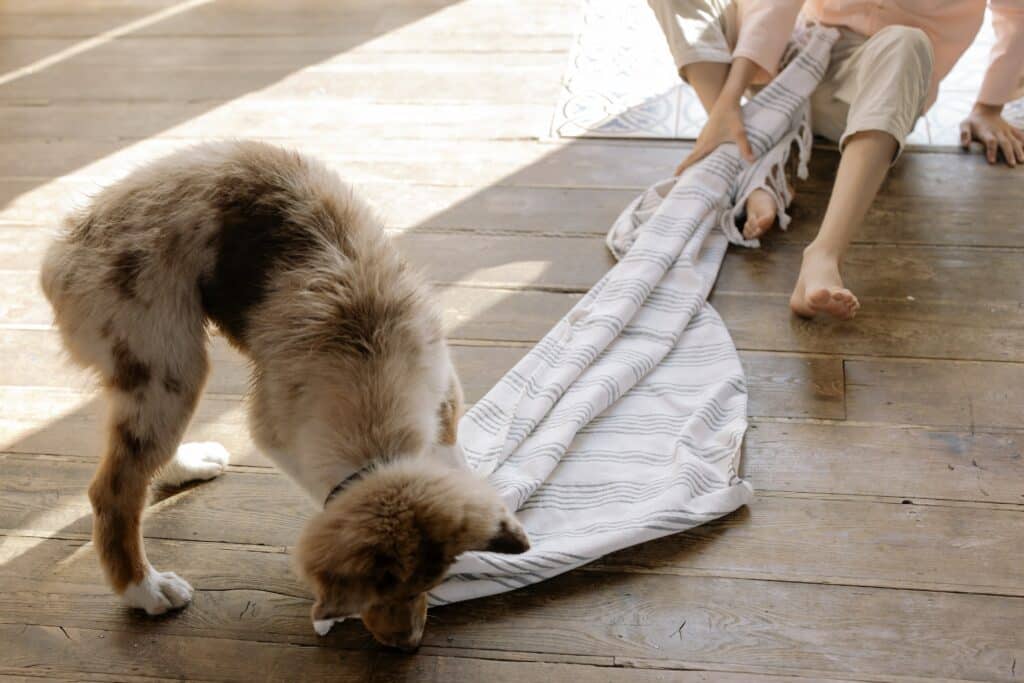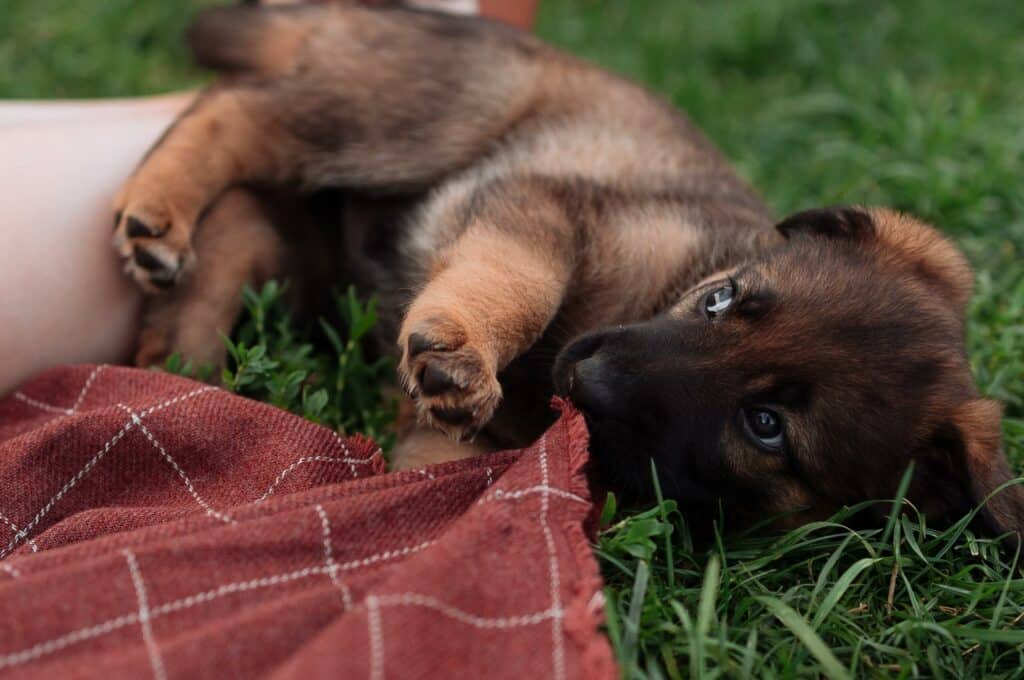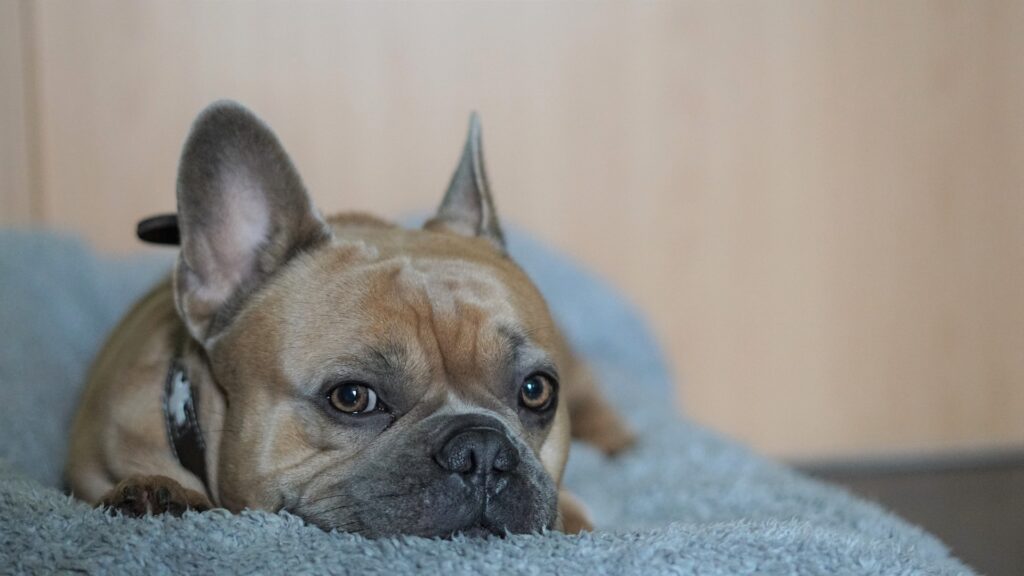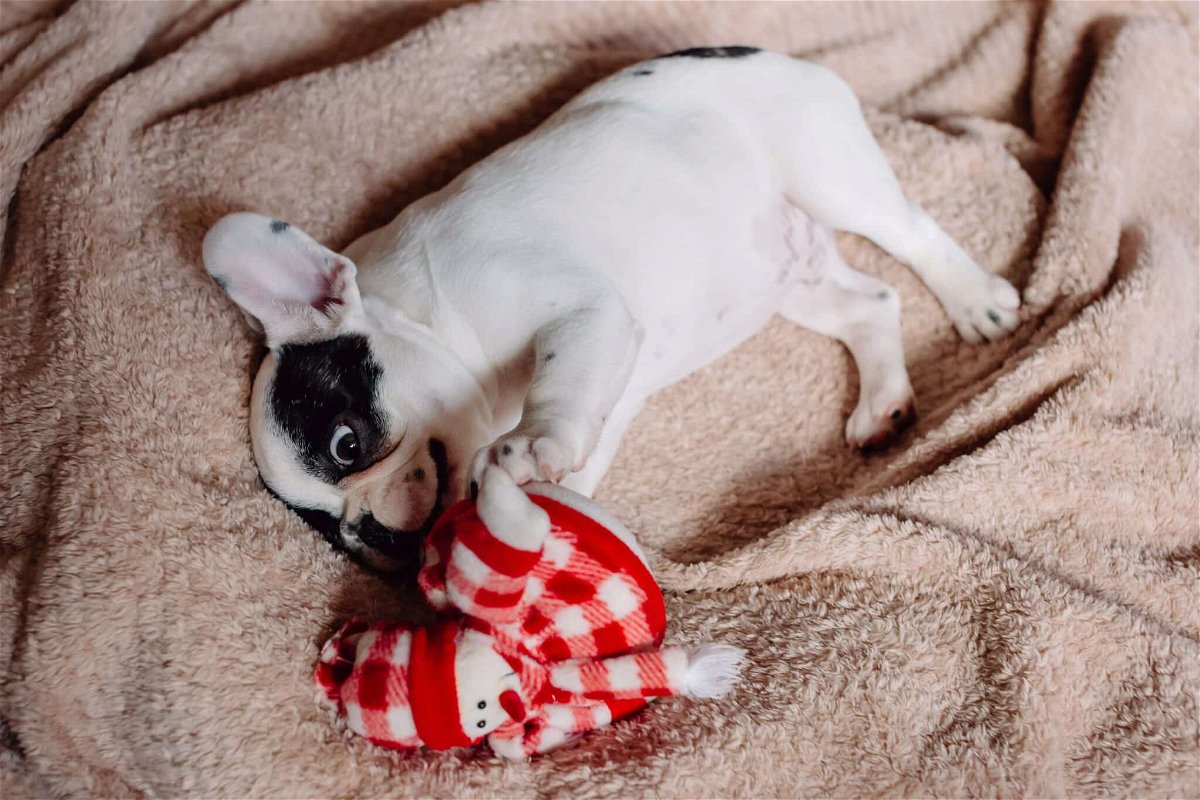We're an affiliate
We hope you love the products we recommend! Just so you know, we may collect a share of sales or other compensation from the links on this page at no additional cost to you. Thank you if you use our links, we really appreciate it!
Have you ever found your furry friend lying beside a shredded blanket with his paws holding down the remaining chunk?
If so, you have probably asked yourself ‘why does my dog chew on blankets & how do I stop it?
You are not alone! Many pet parents have had their fair share of frustration in having their dogs chew on blankets.
This behavior might appear to be normal and harmless but it could turn out to be a problem if your pup chews and swallows some of the fabric material.
It will also be costly on your side since you will have to replace your dog’s blankets more frequently.
Come along with us as we explore the possible reasons why your dog chews on blankets and the steps you can take to tone down the behavior.
Watch out for our answers to the most frequently asked questions about this topic.
The Difference Between Nibbling and Chewing
Whilst both actions involve the use of mouth and teeth to interact with items, there is a noticeable difference between nibbling and chewing.
Nibbling is when the dog takes gentle and small bites out on the blanket without causing serious damage to the fabric material.
Nibbling is mostly seen in puppies who are exploring their newly-found environment. They will most likely nibble on various items to discover their feel and taste.
This behavior will typically not cause any harm to the item being nibbled on and your dog will not risk swallowing portions of the fabric.

Chewing, on the other hand, is the action where the dog bites and tears down an object e.g., a blanket. We can liken chewing to when the pooch chews a bone to extract the meat.
This behavior is more forceful than nibbling and it will most probably cause damage to the item being taken down. It also causes more problems when the dog ingests foreign objects being chewed.
8 Reasons Why Dogs Chew on Blankets
There are several reasons why your dog might decide to chew on blankets. Here are some of them:
1. Premature weaning
A good number of dogs who show this behavior might have been rashly weaned from their mothers during puppyhood.
This action impacts their biological need to suckle and they, therefore, develop the new habit of nibbling items around them such as blankets and beds.
2. Teething in puppies
Puppies will find the urge to chew on objects including blankets during the teething phase. This is an attempt to alleviate the pain and soothe the soreness brought about by the new sprouting adult teeth on the gums.

3. They are bored
When a dog stays alone for extended periods, they may resort to finding ways to create fun and this might include destructive behaviors.
A bored dog could chew on their blanket as a way to get physical and mental stimulation to combat the loneliness at the moment.
4. The blanket smells like you
The blanket could be having your smell and your canine friend may decide to sniff, pull, and chew the blanket to get your feeling when you are away.
5. Stress and anxiety
If your adult dog is showing persistent habits of chewing blankets, then they could be stressed or anxious about something emotionally affecting them.
This could be a result of various reasons including moving into a new home, dealing with a new pet, staying lonely all day long, or lacking physical and mental stimulation, etc.
If you notice your furry friend taking on their blankets while whining, pacing, barking, or just becoming fidgety, then this could be a sign of anxiety disorders.
6. Nutritional deficiencies
Your dog might be chewing on the bedding because they are in search of some nutrients missing in their daily diet.
This does not necessarily mean that your dog is hungry, but it is an indication that they don’t receive a healthy & balanced diet to keep them fit.
Your dog’s food could also be very low in calories and they may look for other objects to chew in search of more energy-rich food.
7. Seeking attention
Your dog might have learned that chewing on the blankets always gets your attention every time. They may resort to this behavior in search of your attention when they need your presence.
8. Exploration and exercises
A young dog might chew on objects around them to explore their environment to dig up the quality, feel, and taste of everything in their sight.
They could also pull and chew on the blankets as a way of getting physically and mentally active to release pent-up energy.
This will mostly be observed in dogs that do not get enough exercise during the day.
How Do I Stop My Dog From Chewing Blankets?
There are several things you can do to tone down your dog’s habit of chewing blankets. Here are some of them:
1. Don’t encourage your dog to chew on blankets
If you notice your dog nibbling or chewing a blanket, you should do your best to discourage them from going in that direction.
Do not give them any rewards immediately after they chew on objects. You should also avoid giving your dog too much attention when they chew on blankets because they will learn that chewing will immediately get them what they want.
What you can do instead is to remove the blanket from your dog’s presence and instruct them to sit and stay calm using verbal cues.
2. Provide chew toys
Give your dog the appropriate toys to nibble and chew. This will let them know that there are safe and more interesting ways to play with their teeth than chewing on the soft fabric in blankets.
Make sure to choose a variety of toys to provide your pup with endless fun whenever they get bored.
If you have a teething puppy, go ahead and look for the chew bones that are specifically meant to aid in their teeth development.
3. Get a chew-proof dog blanket
While addressing the root problem in your dog’s chewing behavior, you can invest in a quality chew-proof dog blanket.
This will ensure your pup doesn’t shred up their bedding during the process of unlearning the destructive behavior.

It also eliminates the chances of your furry friend ingesting some fabric materials and also removes the need for frequently replacing the blanket.
These durable blankets are also cozy and luxurious. Some of them are highly versatile meaning you can use them both for indoor and outdoor situations. There is simply an option for everyone.
4. Regular exercises
You should always give your dog regular physical and mental stimulation to prevent them from being bored or building up anxiety.
Giving your pup enough exercise will reduce the chances of destructive chewing especially if it was caused by boredom.
5. Training
If your dog can’t seem to stop chewing on blankets, you should consider training them with the guidance of a qualified canine behaviorist.
Have Caution with Anti-Chew Sprays
You might have heard that anti-chew sprays (also called chew deterrents) might provide a quick fix for your dog’s chewing behavior.
While they might seem to work, we do not recommend using such products to stop your dog from chewing on blankets.
These anti-chew sprays for dogs are formulated with chemicals that are bitter for dogs and cats. But sometimes they also contain alcohols such as isopropanol which is considered to be toxic for dogs if ingested, and stinging chemicals.
Remember your dog needs to sleep on the blanket to get warmth and comfort during the chilly nights.
And so when you spray their bedding with such chemicals, you are also creating an unsafe environment for them to spend time on.
The smell and taste of these products are bitter and might cause your dog to be uncomfortable on their beds.
Additionally, anti-chew sprays will NOT address the underlying cause of your dog’s destructive chewing behavior.
Whilst they may stop chewing on blankets for the time being, your pooch could still be predisposed to the underlying issues which could lead to major problems.
Should You Punish Your Dog for Chewing on Blankets?
No, you should not punish your dog if they nibble or chew on blankets. We know it can be frustrating having to deal with a dog who can’t stop chewing, but you should never go on the harsh route of punishing them.

Scolding and punishment are not effective ways of correcting destructive behaviors in dogs. They only lead to the buildup of fear, stress, and anxiety which will make the problem worse.
Some dogs will learn not to chew on blankets within a few days of training while others might take months to learn. Be patient with your pup and know when to call a professional trainer to help you out.
FAQs’ About Dog Chewing on Blankets
1. Do dogs grow out of chewing?
When your dog transits from puppyhood to adulthood to finally to senior years, their cravings to chew will certainly fade away but will not disappear completely.
You should always address your dog’s destructive chewing behavior as early as possible to instill good manners and prevent it from becoming an innate habit.
2. Why does my dog chew on blankets when excited?
Excitement could trigger your pooch to chew on objects including blankets, and other items. This is because dogs increase their adrenaline level when excited and they get the urge to chew on objects to release their energy.
Some dogs would also pull and chew on blankets when excited as a way of inviting you to join them for a play.
3. Why does my dog nibble blankets with his front teeth?
Your dog could be using their front teeth to nibble their blanket because they are just exploring and investigating their environment.
They might find the smoothness, smell, and taste of the blanket to be appealing and therefore set their front teeth to discover more.
Though nibbling is common in most dogs, in some cases it could be a sign of an underlying issue such as boredom, separation anxiety, or underlying behavioral issues.
4. Is blanket chewing harmful to dogs?
Chewing blankets can be harmful to dogs if they swallow and ingest small fragments of fabric and threads.
5. What happens if a dog eats a part of a banket?
Ingesting foreign matter might cause your dog to have an intestinal blockage which is a serious condition that might be life-threatening if not handled immediately.
Symptoms of a blockage in dogs include nausea, vomiting, loss of appetite, lethargy, constipation, or abdominal pain.
Dog blankets are furnished with dyes and other synthetic chemicals which could also be toxic for your dog when ingested.
Speak to your vet immediately if you suspect that your dog has swallowed a part of the blanket. Early treatment will prevent them from suffering dire consequences.
To Conclude
You should always focus on your pup and try to attend to the underlying problems.
There are various reasons that make dogs chew on blankets and you should endeavor to give them an appropriate outlet to redirect their chewing habits.
Punishing your dog or using anti-chew sprays will not give you the permanent solution you are looking for.
You can reach out for the services of a professional dog trainer if your furry friend does not seem to improve their chewing habits.
Laura is the founder of Furs'n'Paws. She is a also a pet writer and expert with more than 20 years of experience of working with dogs and cats. She developed a very strong love for animals at a young age. Her passion led her to establish a thriving pet sitting and dog walking business in Dubai. As an expert in pet training, behavior, and nutrition, Laura is committed to helping pet owners and pet lovers by offering high-quality information on a wide range of topics.



No responses yet